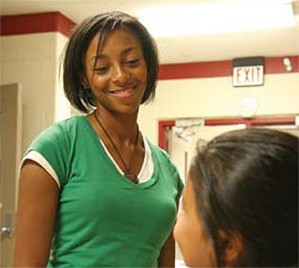
Lauren Davis entered the School of Social Work as an MSW student through the door of the Detroit Initiative in Psychology. It was upon “seeing the resiliency and hidden talents of the youth I encountered despite disparities in their neighborhoods” that Lauren decided to pursue a social work degree.
Lauren, who is doing her field work with the Detroit Initiative, began participating as an undergraduate in 2005. “My commitment to working with populations of color is what propelled me to take a course through the Detroit Initiative. I have been hooked ever since!” she exclaims.
The School’s partnership with the community to engage in research, education, and service (see story, p. 2) easily extends to its students. Through the Detroit Initiative in Psychology, a community service learning project established in 1995 by Professor Lorraine Gutiérrez and now-Professor Emeritus Oscar Barbarin (both with joint appointments in social work and psychology), students have received meaningful opportunities for learning and professional development.
Other students working with the Detroit Initiative are Elizabeth Meier, PhD student; Sara Crider, MSW/PhD student; and MSW students Soo Yeon Ko and BoRin Kim, all who are conducting evaluations of the program.
Through the Detroit Initiative, U-M faculty and students are committed to working on the needs identified by the organizations they partner with. The five current organizations are the MOSAIC Youth Theater, People’s Community Services of Metropolitan Detroit, Latino Family Services, New St. Paul Tabernacle Head Start, and Omankane: The Collective, an after-school program at Bagley Elementary School.
Lauren’s present role in the Detroit Initiative is as community liaison, keeping open lines of communication between the Detroit sites and the staff and students of the program. She also helps to facilitate the class component of the program, which offers a service-learning experience for undergraduate students.
Her activities have included organizing a volleyball tournament to raise money for the sites, assisting People’s Community Services in an arts and crafts program that introduces students to various art media, and helping elementary school children hone their reading skills.
But what struck her most was seeing the enthusiasm and curiosity of youth, ages 6 to 16, from the Delray neighborhood, when she helped organize a visit to the University of Michigan campus. The youth took a tour of the campus and listened to a panel telling of the life of a successful minority college student and addressing their concerns.
Many had never before been on a college campus or known people who have attended college. One youth commented, “I used to hate the idea of going to college, but now it seems like I would really like it.”
“The entire day was a reciprocal learning process for both the youth and myself,” reflects Lauren. “Growing up, there was an expectation that I would go to college, and I lived in an environment that was conducive to going to college (schools, neighborhood, mentors, etc.), which is not necessarily the case for many of these youth.
“The visit intensified my desire to convey that college is not only for the affluent, and that it is a place for these youth as well.”
—Tanya C. Hart Emley is editor of Ongoing